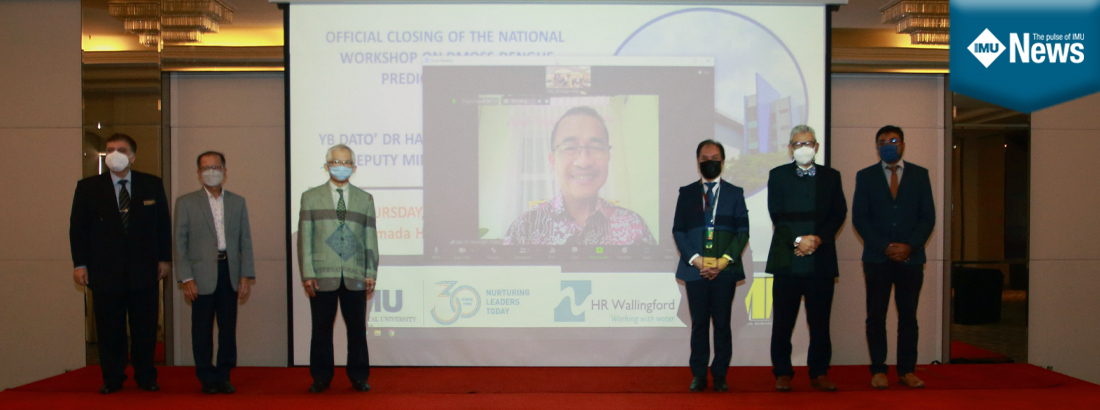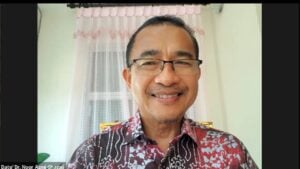An international collaborative project led by International Medical University (IMU), the D-MOSS system will utilise data to predict the likelihood of future dengue outbreaks to aid in nationwide effort for disease containment and eradication.
Petaling Jaya, 13 January 2022 – The Ministry of Health Malaysia (MoH) will implement a data-driven prediction system, Dengue MOdel forecasting Satellite-based System (D-MOSS), developed over the last two years by a consortium headed up by HR Wallingford in partnership with the International Medical University and the Institute for Medical Research under the Malaysian Ministry of Health. The work is funded by the UK Space Agency’s International Partnership Programme. The system predicts any outbreak 6-months in advance for timely intervention and management of the disease. The system has successfully been implemented in Vietnam as well as parts of Malaysia (Kedah and Melaka) and has successfully won eight awards:
| Name of Award | Awarded | Highly Commended |
|---|---|---|
| United Kingdom IT Industry Awards |
|
|
| Engineering & Technology Innovation Awards |
|
– |
| Digital Technology Leaders Award |
|
– |
| British Expertise International Award |
|
– |
| Group on Earth Observation (GEO) Sustainable Development Goals (SDG) Award |
|
– |
Already a success in Vietnam, D-MOSS was extended to Malaysia whereby Prof Datuk Dr Lokman Hakim, International Medical University’s Pro Vice-Chancellor, Research and Director of IMU’s Institute for Research, Development and Innovation was invited by HR Wallingford to participate and lead the project in the nation due to his expertise in the disease. In 2019, the Malaysian consortium for D-MOSS was established with IMU as the lead involving HR Wallingford, Institute for Medical Research (IMR) and the MoH.
About D-MOSS
D-MOSS involves machine learning and modelling using Malaysian retrospective dengue data (10 years) to enable the development of a forecasting system that can predict the likelihood of dengue outbreaks. The system uses freely available satellite data from the European Space Agency (ESA), the National Aeronautics and Space Administration (NASA) and the Japan Aerospace Exploration Agency (JAXA). The data includes landcover, elevation, rainfall, temperature, humidity, and wind speed. Once collected it is collated and fed into statistical forecasting models of disease incidence, which produce the forecasts of dengue outbreaks. These forecasts are made available on a simple, regularly updated user interface, which shows the likelihood and location of an outbreak up to six months in advance.
“This is especially useful for Malaysia. As of 27 November 2021, a total of 23,647 dengue cases were reported according to World Health Organisation (WHO). Fortunately, a significant decrease of 73% compared to the same period in 2020. However, the country continues to record cases and even deaths due to dengue. With this modelling system in place nationwide, which predicts when and where dengue outbreaks will occur, well before mosquitoes start to breed, and people start to get sick, authorities on the ground can strategically plan timely interventions, moving precious resources to contain and eradicate hot spots, in hope that we will eventually reduce dengue incidences over time,” says Prof Datuk Dr Lokman.
D-MOSS in Malaysia was first piloted in Melaka and Kedah in 2020. Predictions and alerts from the system of an impending rise in infections had enabled respective District Health Offices to respond accurately thus preventing the prediction from happening.
Spurred by this positive response in the two pilot projects, MoH has decided to implement D-MOSS across all states from September 2021 onwards. A 3-day workshop involving Vector-borne Diseases Control Unit staff from all over Malaysia was held from 11 to 13 January 2022 in Kuala Lumpur. The staff were familiarised with the D-MOSS Malaysia system and also deliberated on the draft guideline on interventions that can be carried out when an outbreak signal is detected by the system.
YB Dato’ Dr Noor Azmi Ghazali, Deputy Health Minister 1 who officiated the closing ceremony of the national D-MOSS workshop hope that the state and district departments will maximally utilise the system in their dengue prevention and control strategies so that severe dengue outbreaks can be prevented from occurring.
“When we are able to predict the occurrence of an outbreak, then we should be able to take measures to prevent it. This will not only reduce suffering and save life but also cost saving when dengue is no longer a public health problem,” says Dr Noor Azmi.
Dr Gina Tsarouchi, the D-MOSS Project Manager shared “We’re delighted to hear that the Ministry of Health has decided to implement D-MOSS across all states of Malaysia. D-MOSS improves the lives of people at risk from dengue by using space-based technology to forecast outbreaks up to six months in advance. Public health officials can use the forecasts to act quickly to prevent the disease from spreading. In addition, with around half the world’s population at risk from dengue, its potential benefit is huge. Prof Lokman’s team at the IMU and IMR have been instrumental in developing and implementing the D-MOSS forecasting system in Malaysia. IMU and IMR’s expertise, dedication, commitment and enthusiasm for the D-MOSS project has been key to its success. We are keen that the collaboration with IMU and IMR continues to ensure D-MOSS’s sustainability in the future.”
About International Medical University
Founded in 1992, the IMU is Malaysia’s first and most established full-fledged private medical and health sciences university. Today, the IMU offers over 20 health professional programmes at pre-university, undergraduate and postgraduate levels in Medicine, Dentistry, Pharmacy, Health Sciences, and Postgraduate Studies. IMU has established a solid global network that provides students with greater learning and training opportunities through its credit-transfer agreements with over 30 world’s prestigious universities. In the IMU, students are aspired to be future healthcare professionals who are committed to lifelong learning and imbued with a sense of good citizenship, leadership and ethical behaviour.
International Medical University is a medical education arm of IHH Healthcare Berhad (5225) (IHH), a public listed company in Bursa Malaysia. IHH is a leading international provider of premium healthcare services. Known as the World’s second largest listed healthcare operator, IHH presently operates over 15,000 licensed beds in 80 hospitals across their home markets of Malaysia, Singapore, Turkey and India, and the key markets Greater China and across Asia and Central and Eastern Europe.
For more information, please visit IMU website at www.imu.edu.my or its blog at www.imu.edu.my/imunews
About HR Wallingford
HR Wallingford leads the D-MOSS consortium, working alongside the London School of Hygiene and Tropical Medicine, the UK Met Office and Oxford Policy Management in the UK, and with the following international partners: the International Medical University in Malaysia, the Institute for Medical Research under the Malaysian Ministry of Health, the United Nations Development Programme, the World Health Organisation, the Vietnamese Institute of Meteorology, Hydrology and Climate Change, the Pasteur Institute Ho Chi Minh City, the National Institute of Hygiene and Epidemiology in Vietnam. The project is sponsored by the UK Space Agency’s International Partnership Programme (IPP), a five-year, £152 million programme designed to partner UK space expertise with overseas governments and organisations to deliver sustainable, economic or societal benefits.
More information about D-MOSS and its international implementation can be found at HR Wallingford website: https://www.hrwallingford.com/










